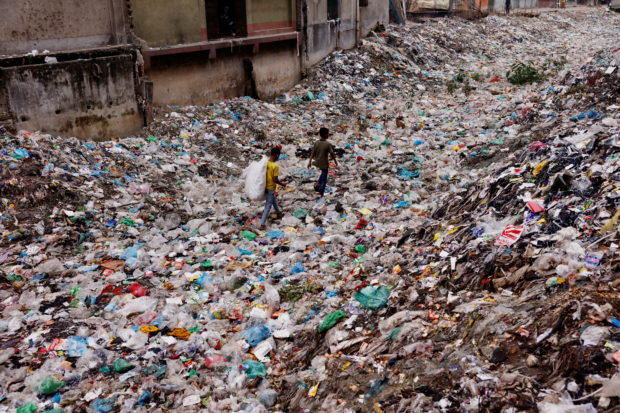Pollution causing more deaths than COVID, action needed, says U.N. expert

Children walk over a polluted area as they collect plastic materials in Dhaka, Bangladesh, January 24, 2022. (REUTERS)
GENEVA – Pollution by states and companies is contributing to more deaths globally than COVID-19, a U.N. environmental report published on Tuesday said, calling for “immediate and ambitious action” to ban some toxic chemicals.
The report said pollution from pesticides, plastics and electronic waste is causing widespread human rights violations and at least 9 million premature deaths a year, and that the issue is largely being overlooked.
The coronavirus pandemic has caused close to 5.9 million deaths, according to data aggregator Worldometer.
“Current approaches to managing the risks posed by pollution and toxic substances are clearly failing, resulting in widespread violations of the right to a clean, healthy and sustainable environment,” the report’s author, U.N. Special Rapporteur David Boyd, concluded.
“I think we have an ethical and now a legal obligation to do better by these people,” he told Reuters later in an interview.
Article continues after this advertisementDue to be presented next month to the U.N. Human Rights Council, which has declared a clean environment a human right, the document was posted on the Council’s website on Tuesday.
Article continues after this advertisementIt urges a ban on polyfluoroalkyl and perfluoroalkyl, man-made substances used in household products such as non-stick cookware that have been linked to cancer and dubbed “forever chemicals” because they don’t break down easily.
It also seeks the clean-up of polluted sites and, in extreme cases, the possible relocations of affected communities – many of them poor, marginalized and indigenous – from so-called “sacrifice zones”.
That term, originally used to describe nuclear test zones, was expanded in the report to include any heavily contaminated site or place rendered uninhabitable by climate change.
“What I hope to do by telling these stories of sacrifice zones is to really put a human face on these otherwise inexplicable, incomprehensible statistics (of pollution death tolls),” Boyd said.
Boyd considers the report, his latest in a series, to be his most hard-hitting yet and told Reuters he expects “push back” when he presents it to the Council in Geneva.
U.N. rights chief Michelle Bachelet has called environmental threats the biggest global rights challenge, and a growing number of climate and environmental justice cases are invoking human rights with success.
Chemical waste is set to be part of negotiations at a U.N. environment conference in Nairobi, Kenya, starting on Feb. 28, including a proposal to establish a devoted panel, similar to the Intergovernmental Panel on Climate Change.
gsg
For more news about the novel coronavirus click here.
What you need to know about Coronavirus.
For more information on COVID-19, call the DOH Hotline: (02) 86517800 local 1149/1150.
The Inquirer Foundation supports our healthcare frontliners and is still accepting cash donations to be deposited at Banco de Oro (BDO) current account #007960018860 or donate through PayMaya using this link.